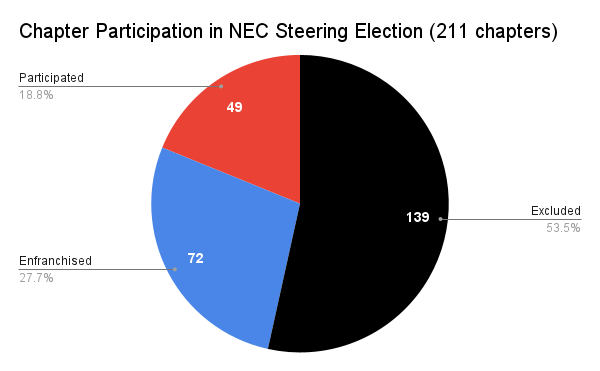Critique and Reflection on the NEC Steering Election

Introduction
On December 13, 2023, the results of the National Electoral Commission's inaugural Steering Committee elections were announced. Hopefully, we can learn from the issues exposed by the development and implementation of this election.
In a relatively rushed and opaque process, the outgoing NEC leadership body devised a plan for electing the subsequent steering. Unlike the elections for national Co-Chair, NLC co-chairs, or the Democracy Commission, this election would not entail utilizing the elected delegates to the 2023 DSA Convention. Instead, the NEC devised a unique system for electing its Steering Committee, which was initially created without the advisement of the NPC. Less than two months after the election, emails were sent to chapters indicating whether they had been chosen to participate.
The NEC SC Elector System
The outgoing NEC steering devised a plan for its steering election by allocating chapters “electors.” Most significantly, the NEC limited the electors to only chapters with an endorsed national electoral campaign within the past three years. This elector system meant only 72 chapters could participate in the election out of 211. Chapters were then allocated a number of electors depending on how many constitutional members they had according to the following algorithm:
Chapters with up to 600 constitutional members: 2 representatives
Chapters with 601-1000 constitutional members: 3 representatives
Chapters with 1000-3000 constitutional members: 4 representatives
Chapters with more than 3000 constitutional members: 5 representatives
However, after the elector process was officially announced to DSA membership, the system was changed. Now, the largest chapters got five electors, and each of its representatives' votes weighed far more heavily than those from smaller chapters. The use of the criteria for chapter participation was confusing and never fully explained, with outgoing NEC Steering Members suggesting that it was done because the NEC did not have an existing membership base. Although that is true, the criteria developed were unnecessary. Part of what the NEC has struggled with is working with chapters to build their electoral programs, and by excluding them from the democratic process, the NEC excluded the voices of some of those most in need of enhanced participation in DSA electoral work.
The NEC allowed for chapters to choose how their electors were selected. There was no requirement for a democratic election within chapters. Due to time constraints, many chapter steering committees simply picked their representatives without the input of the local membership. There is no centralized way of knowing how chapters elected their representatives, so whether chapters used a particular voting system or some newfound way of electing someone is unknown.
Even more concerningly, participation in the NEC’s convoluted system was also poor. According to NPC member Ahmed, “[o]nly 135 electors out of 182 electors were actually seated. Only 49 chapters out of 72 chapters were able to send electors.” The NEC election had the following level of participation from the organization as a whole:
- 72/211 Chapters = 34% of All Chapters Allowed to Participate
- 49/72 = 68% of Enfranchised Chapters Participated
- Final Chapter Participation is only 23% of all chapters in DSA
- 135/182 = 74% of Electors Seated
Despite limiting the participation of chapters in the election process, the NEC election still failed to achieve a modest 70% chapter turnout. When considering turnout, this meant less than a quarter of all DSA’s chapters had any input in the new NEC Steering. This level of democratic participation in a national DSA election is unacceptable, and it looks much worse when compared to the 90%+ turnout in the co-chair and Democracy Commission election that was held just several days prior.
Management of the Election
The issues with the NEC election process were not just the opaque and convoluted electoral process and meager turnout. The NEC Steering, who decided to put themselves in charge of this process, also failed to manage the process competently.
The NEC made a significant mistake by retroactively applying “weighted” electors' votes after the election process had already been announced. It is unclear how long this had been under consideration and what triggered the addition of a significant change in the operation of electors.
We can debate whether this is a bad system, but the focus should be that a change to the function of electors was made after the electoral process had begun. It is rare to see such a significant change in an attempted democratic process after it is already in motion, and one would expect that such a change would be made with far more transparency and, perhaps, a delay in the electoral process. Instead, the representative distribution was announced to chapters, and then afterward, the distribution fundamentally changed with the addition of vote weighing.
Another issue with the election was simply its timing. Not only was the election period extremely short, with chapters getting only about a month to get their electors selected, but the actual voting period was only open for two full days to cast a ballot. A single public forum, held on a Sunday afternoon, only allowed each candidate (who could show up) two minutes to make their case to the relatively few electors on the call. This short timeline was too much for many chapters that could have sent electors, conflicting with their general body meetings and being out of their regular course of business. It is no wonder that over 30% of selected chapters failed to send electors. The NEC election also conflicted with the ongoing, much larger, better-advertised elections for the National Co-Chair, Democracy Commission, and NLC Co-Chairs. Not only was the NEC election far too brief to garner an appropriate amount of attention within DSA, but it was launched amidst elections that understandably garnered far more involvement from the organization.
After voting had begun, the NEC sent an email clarifying how ballots worked.
Electors, while the ballot instructions say to only rank 13 candidates we want to be clear that your ballot will still be valid if you rank more than 13 candidates.
Lastly, ballots will still be open for 48 hours with all ballots closing at 11:59pm PT December 12. We will be sharing the results of the election as soon as possible on December 13 once results have been finalized.
This email went out after voting had begun and highlighted a contradiction in the voting system. Typically, STV allows a vote to continue indefinitely as candidates are eliminated. For the 2023 NPC election, your vote counted for every ranked candidate. It is unclear why the NEC decided to restrict the application of the STV vote process to only the first 13 ranked candidates despite having 43 apply. The fact that the NEC itself was unaware of the confusion this would cause and was required to issue a clarifying email a day and a half into the three-day voting period further indicates the issues with the process.
Red Star Reflection: NEC Liaison Sam HL
In reflecting on the recent NEC election, I acknowledge that there were instances where I, as an NPC member, could have exercised greater scrutiny. Two specific consultation points come to mind. The first occurred shortly after the establishment of NEC liaisons when Glenn sought our input. At that juncture, we found ourselves questioning the potential complications of impeding the election process. In retrospect, I should have pushed to take a more assertive stance.
The second instance unfolded during an NEC liaison call, where the topic of weighted proportional ballots was broached. I acquiesced to the notion, emphasizing the positive aspect of proportional representation. However, I now realize that my focus on this aspect may have diverted attention from what I now perceive as a more substantial concern – the delegates system and the methodology for constructing an electorate from scratch.
In hindsight, I should have scrutinized the delegate system and the overarching election accessibility more rigorously. This self-critique highlights areas where I could have advocated for a more thorough evaluation of the electoral process. Though many of the individual decision points made some sense at the time, an accumulation of these decisions resulted in a process that was not transparent or productive.
Going Forward
The NEC Steering Election, from start to finish, was opaque, confusing, and unevenly run. While the predominant fault lies with the outgoing NEC Steering for plunging head first into this process without Convention-dictated feedback and involvement from the NPC, the NPC is responsible for not appropriately addressing the NEC Steering Election process. While there was a presumption of good faith that the NEC SC would have designed an appropriate process, this was mistaken and irresponsible. This is not to say that the election was run maliciously, but the NPC should have had a much stronger hand in facilitating the process of seating a new NEC Steering to avoid what we ended up getting. Credit to NPC member Ahmed for sounding the alarm early on in the process with his concerns over the process and timing of the NEC SC election. It makes little sense for the leadership of a struggling national body to nearly unilaterally decide how it should be succeeded. The NEC is an exceedingly important body; going forward, much more attention will be needed to its form and function.
The NEC Steering election is an excellent example of the need to develop a universal system for national DSA elections. We hope the Democracy Commission, elected by the 2023 Convention Delegates via STV, will deliberate on this topic and develop recommendations accordingly.
Future NEC Steering Committees must not be selected under this undemocratic process, which ultimately fails to create a body that reflects the organization's makeup as a whole. Going forward, the regular application and voting process by the NPC body on NEC Steering membership should be returned for the following NEC term.
Further Discussion
If you're interested in discussing this piece with other DSA members, head on over to the DSA Discussion forums at https://discussion.dsausa.org/t/critique-and-reflection-on-the-nec-steering-election/30731
The forums are open to all DSA members in good standing. If you haven't made an account, you can do so at optin.dsausa.org, and if you're not a DSA member in good standing, sign up or renew your dues at https://act.dsausa.org/donate/membership/

